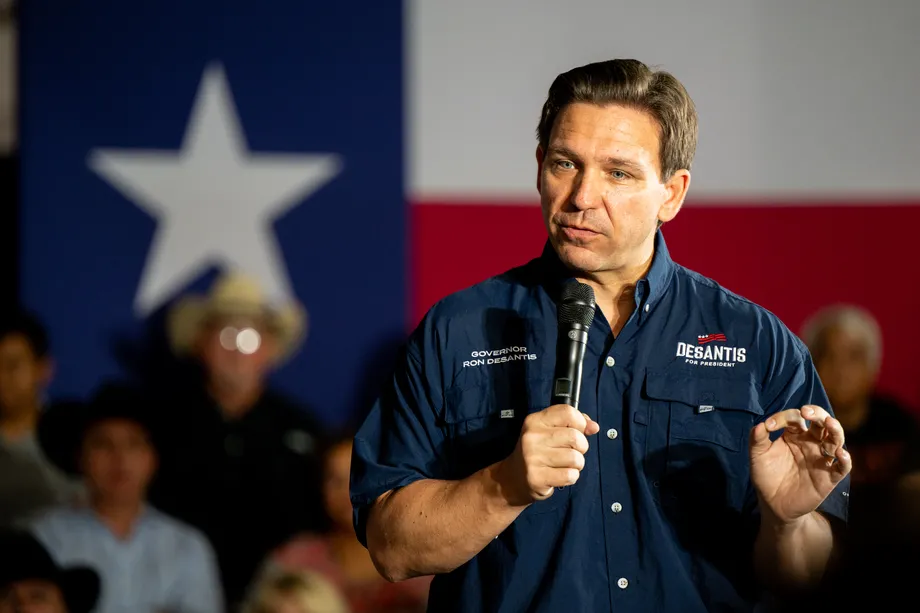The Florida governor’s immigration platform shows how he struggles to articulate why he’s a better version of Trump.

Florida Gov. Ron DeSantis unveiled an immigration platform on Monday that closely mirrors the policies pursued by former President Donald Trump. By aligning himself with Trump’s immigration agenda, DeSantis hopes to gain support and distance himself from legal issues surrounding Trump, such as the criminal charges and ongoing investigations.
Hunter Demands $10M From Chinese Energy Firm Because ‘Bidens Are Better,’ Have ‘Connections’
Ron DeSantis’ immigration plan reflects voters as a “Make America Great Again” (MAGA) candidate without the legal baggage associated with Trump. He has proposed ending birthright citizenship, requiring asylum seekers to remain in Mexico during the application process, and eliminating “catch-and-release” policies that allow nonviolent immigrants to be released while awaiting deportation proceedings.
In his speech in Eagle Pass, Texas, Ron DeSantis said his platform goes further than Trump’s, notably empowering state and local authorities for border enforcement and advocating the use of “brutal force” against drug traffickers and people who show hostile intent at the border.
However, despite positioning himself to the right of Trump on issues like abortion and Covid-19, DeSantis has not introduced any new ideas on immigration. That could be a challenge for the governor as he struggles to carve out a niche in a crowded Republican primary field. Additionally, he needs to make it clear to primary voters, who may not be overly concerned about Trump’s legal problems, why he is a good candidate.
Trump’s lead in New Hampshire grows, but DeSantis loses ground and support for new candidates grows
Vinny Minchillo, a Texas-based Republican strategist, believes Ron DeSantis‘ reliance on the Trump brand is not a recipe for success. Noting that DeSantis is essentially rehashing Trump’s immigration platform without offering anything new, he argues that voters are seeing through the strategy.
Governor Ron DeSantis is attempting to make a nuanced argument to appeal to primary voters who are fervent supporters of former President Trump. He claims that not only is he more aligned with Trump on various issues, including immigration, but also that he is more effective in implementing a conservative agenda.
Ron DeSantis points to his experience governing as a conservative in Florida as evidence of his ability to deliver on conservative policies. One example is his promise to continue constructing the southern border wall, which he emphasizes remains unfinished. While Trump allocated around $15 billion for its construction, mostly from the Defense Department’s budget, only 453 miles of the 1,954-mile US-Mexico border were completed with a “border wall system.”
The call to “Build the wall!” was a prominent rallying cry among Trump’s supporters during the 2016 campaign, and it continues to resonate, as demonstrated by an August 2022 NPR/Ipsos poll where 46 percent of Americans expressed support for its construction.
Ron DeSantis, without mentioning Trump by name, insists that there should be no excuses and urges action to fulfill this promise. He rejects empty rhetoric and hollow promises, emphasizing the need for tangible results.
In response, Trump took to TruthSocial and dismissed DeSantis as a “failed candidate” whose purpose was merely to reiterate his commitment to implementing the strongest border measures, similar to what Trump had done. Trump sees DeSantis’s visit as a waste of time.
This exchange highlights the challenges Ron DeSantis faces in differentiating himself from his former mentor, Trump, whose endorsement played a crucial role in DeSantis’s successful bid for the governorship in 2018. While DeSantis presents himself as a more focused and professional version of Trump, the former president can always counter by claiming that he is the true Trump.
Ron DeSantis has also attempted to distinguish himself from Trump on issues like Covid-19 and abortion. He pushed back against Trump’s recent assertion that New York handled the pandemic better than Florida and criticized Trump’s abortion policies as too permissive.
However, it remains unclear whether these efforts to position himself as the genuine conservative alternative to Trump are resonating with primary voters, who still overwhelmingly prefer the former president by a margin of more than 30 percentage points on average. Moreover, DeSantis’s hardline positions on the pandemic and abortion may not appeal to independent and swing voters if he were to secure the nomination.
Vinny Minchillo, the Republican strategist, believes that Ron DeSantis has not differentiated himself enough from Trump to make a significant impact on voters. The key question is whether his speeches effectively convey a distinctive message that resonates with the electorate.

